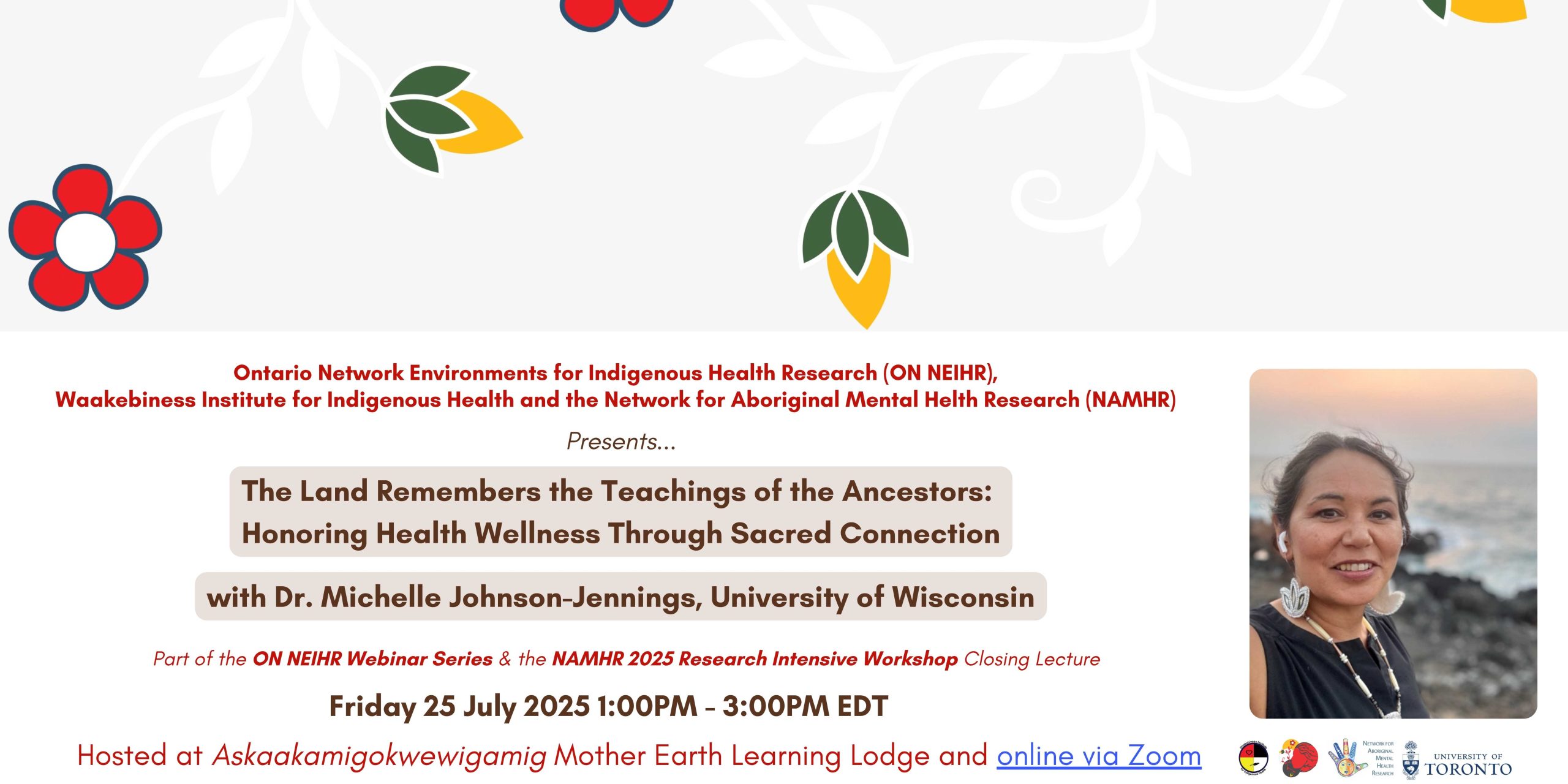- Location
- Askaakamigokwewigamig Mother Earth Learning Lodge (20 Wilcocks St., Toronto, ON M4S 1C6) and online via Zoom.
- Series/Type
- Alumni Event, DLSPH Event, Faculty/Staff Event, Student Event
- Format
- Hybrid
- Dates
- July 25, 2025 from 1:00pm to 3:00pm
Links
Presented by the Waakebiness Institute for Indigenous Health and Ontario Network Environments for Indigenous Health Research (ON NEIHR) …
The Ontario Network Environments for Indigenous Health Research (NEIHR), at the Waakebiness Institute for Indigenous Health and the Network for Aboriginal Mental Health Research (NAMHR) invite you to attend The Land Remembers the Teachings of the Ancestors: Honoring Health Wellness Through Sacred Connection with guest speaker Dr. Michelle Johnson Jennings from the University of Wisconsin!
This special lecture is a part of the Ontario NEIHR Webinar Series and Closing Lecture for the 2025 Research Intensive Workshop at the NAMHR.
Date: Friday 25 July 2025
Time: 1:00 – 3:00 p.m. EDT
Location: This is a hybrid event being hosted in person at Askaakamigokwewigamig Mother Earth Learning Lodge (20 Wilcocks St., Toronto, ON M4S 1C6) and online via Zoom.
Light refreshments will be served, and Ceremony will be led by Knowledge Keeper Clayton Shirt.
Title: The Land Remembers the Teachings of the Ancestors: Honoring Health Wellness Through Sacred Connection
Abstract: This discussion will center on the vital role of land-based healing in fostering Indigenous health and wellness by re-centering ancestral knowledge and relational accountability. Drawing from clinical psychology, Indigenous research frameworks, and community-grounded healing practices, Dr. Johnson-Jennings will examine how land is not merely a backdrop for health interventions, but an active relative, teacher, and medicine. Rooted in the belief that the land remembers, the discussion will focus on how sacred geographies hold the imprints of ceremony, kinship, and teachings that continue to guide Indigenous peoples toward balance and wellbeing.
The discussion will highlight examples from Dr. Johnson-Jennings’ Indigenous land-based healing program that braids together therapeutic approaches with cultural immersion, storytelling, seasonal cycles, and traditional practices. She will share insights into how reconnecting with ancestral lands activates intergenerational resilience, addresses the impacts of historical trauma, and cultivates pathways to individual and collective healing. Emphasis will be placed on ethical community collaboration, cultural safety, and creating space for Indigenous sovereignty in wellness paradigms.
This presentation invites fellow scholars, clinicians, and community leaders to consider how we might deepen our relationships with land, culture, and spirit as foundational to Indigenous futures of health.
Speaker Bio: Dr. Michelle Johnson-Jennings (Choctaw Nation tribal member) is a distinguished American Indian clinical health psychologist with decades of expertise in harm and risk reduction, HIV/AIDS prevention, chronic disease prevention—including diabetes and cancer—and addiction research, focusing on both substance use and food addiction. She currently serves as a Full Professor, Chambers-Hall Endowed Professor, clinical health psychologist and Co-Executive Director for the Indigenous Wellness Research Institute/IWRI, as well as Director for Indigenous Environmental Health and Land-based healing Division. Her work has been instrumental in advancing culturally responsive, community-driven health interventions that address the unique challenges faced by Indigenous populations across the globe.
Grounded in her clinical training, Dr. Johnson-Jennings has dedicated much of her research to Indigenous women and children, particularly in the realm of obesity prevention. Utilizing a community-based participatory research framework, she has employed quantitative, qualitative, and mixed-method approaches to explore and implement effective health strategies. As recognized through the Fulbright Fellowship with NZ, Harvard Leadership in Higher Education fellow, Community Engagement Award, and Health Equity Leadership awards. Over the past 15 years, she has transitioned her focus from clinical settings to community-based initiatives, pioneering innovative land-based healing interventions—including gardening, increased physical activity, and community feasts—that integrate cultural traditions with modern health practices.
Her work has expanded the field’s understanding of historical trauma, discrimination, and the critical role of land and environment in healing. In particular she has co-designed land-based healing interventions through incorporating narrative reactive therapy to place, in which American Indian individuals transform views of trauma into love and hope. She has been at the forefront of designing culturally specific frameworks, such as the Relationship-Centered Decision-Making Framework, the Land-Based Healing Framework, and Indigenous Tribal Health Sovereignty.
Dr. Johnson-Jennings has established global partnerships with Indigenous health organizations, clinics, and communities, securing over $26 million in funding from prestigious institutions such as the National Institutes of Health (NIH), the Canadian Institutes of Health Research (CIHR), the Health Research Council of New Zealand, and government agencies. These investments have supported groundbreaking health centers and interventions aimed at preventing obesity, addiction, HIV, and related chronic diseases—particularly among Indigenous youth, Two-Spirit individuals, and women.
As a leader in the field, Dr. Johnson-Jennings has served as a founding Scientific Director for multiple Indigenous health and research centers, including the Research for Indigenous Community Health (RICH) Center and the Indigenous Wellness Research Institute (IWRI) Division of Indigenous Environmental Health and Land-Based Healing in the U.S., as well as the Wuniska HIV/AIDS Center and the Land-Based Healing Center in Canada. Her extensive collaborations have fostered mentorship and training opportunities for Indigenous scholars and health professionals across First Nations, Māori, and American Indian/Alaska Native communities.
